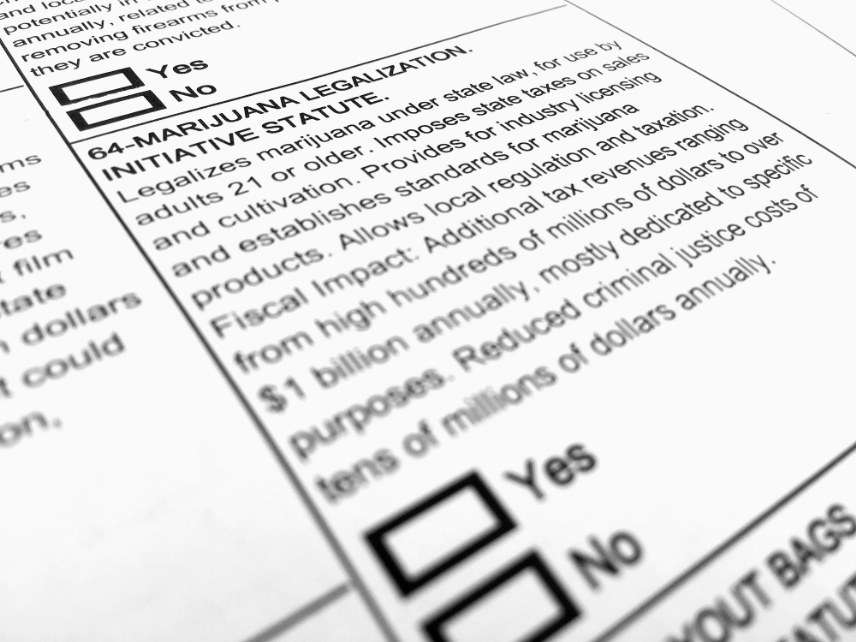Idaho Lawmaker Wants To Make It Harder for Voters To Ignore Him Via Ballot Initiatives
It's already very hard to force issues like medical marijuana legalization to a vote there.

Ballot initiatives have helped states experiment with both wonderful and terrible policies. Without them, we would not be seeing marijuana legalization slowly spreading across the country. But they've also been responsible for harsh criminal sentences for crimes that have helped create the mass incarceration crisis.
They're a famously mixed bag, but so are elections, and presidents, and lawmakers. In Idaho, voters decided last November to expand Medicaid as the result of a ballot initiative put up by citizens. Ballotpedia notes that this Medicaid proposal and a failed attempt to allow the use of video terminals for horse race betting were the first ballot initiatives put up by voters in Idaho since 2012. A medical marijuana initiative was introduced but then withdrawn.
But just passing one ballot initiative passing in six years appeared to be enough for at least one Idaho state Senator, Scott Grow (R–Eagle) to freak out and propose making it harder for citizens to change the laws on their own. Grow has stated that his goal is to make sure Idaho doesn't end up like other states that have multiple ballot initiatives every election.
SB 1159 would increase the number of signatures people would have to collect—from 6 to 10 percent of the voters—and also decrease the amount of time they have to collect them, dropping it from 18 months to 180 days. And they'd have to get a wider spread of voters from legislative districts across the state to qualify.
It's worth noting that the last time voters in Idaho exercised their right to bring laws to a public vote in 2012, they did so to reject some Republican-driven education reforms. After that vote, the state tightened up the rules for introducing ballot initiatives and referendums. I'm not pointing it out to attack the reforms themselves as bad (one established a pay-for-performance plan for teachers, something I'd certainly support). Rather, given that it's already challenging for citizens to get initiatives on the ballot, this is hard to read as anything other than a response by a senator who doesn't like the outcomes.
How else should it be read? Idaho is nowhere near states like California or Oregon or Florida when it comes to voter initiatives and referendums. They couldn't even get a medical marijuana bill on the ballot despite the huge groundswell across the country for easing up the rules, and Idaho's governor has gone to great lengths to stop lawmakers from legalizing medical marijuana and cannabidiol oil on their own.
It's true that ballot initiatives can be frustrating, poorly thought-out or written, and sometimes conceal agendas which certain parties (both public and private) stand to quietly profit from. But all of those flaws apply just as much to the bills that lawmakers themselves propose and vote on.
It can be incredibly frustrating to see what voters will pass if you're a fan of human liberty and limited government. But it's equally frustrating to see how select and powerful interests—like law enforcement groups and teachers' unions—use their influence over lawmakers and their financial donations, to thwart the passage of bills through the typical process. Read Eric Boehm's Reason coverage of medical marijuana battles in Idaho and you'll realize exactly how hard—maybe impossible—it would be to legalize marijuana use there unless the voters do it themselves.
That's the benefit of ballot initiatives, and that also unfortunately means that we have to be vigilant in responding to bad initiatives that would institute rent controls or new, harsh mandatory minimum sentences for opioid crimes and other bad proposals. Ballot initiatives are no better or worse than other components of representative democracy. That a lawmaker is so bent on making it harder for citizens to express their will suggests he doesn't like the competition for power.
Lawmakers should reject SB 1159. If they don't, citizens should, under these harsher rules, fight to force it to a public referendum, and then defeat it.


Show Comments (7)